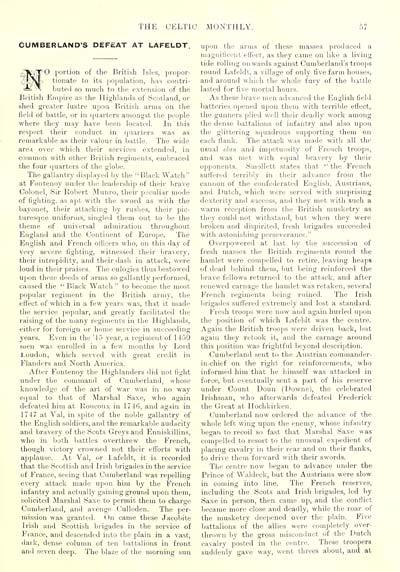Blair Collection > Celtic monthly > Volume 6, 1898
(85)
Download files
Complete book:
Individual page:
Thumbnail gallery: Grid view | List view

fHE CELTIC MONTHLY.
CUMBERLAND'S DEFEAT AT LAFELDT.
'0 iiortion of the British Isles, propor-
tionate to its population, lias contri-
buted so much to the extension of the
Biitish Empire as the Highlands of Scotland, or
shed greater lustre upon British arras on the
field of battle, or in (juarters amongst the people
where they may have been located. In this
respect their conduct in quarters was as
remarkable as their valour in battle. The wide
area over which their services extended, in
common with other British regiments, embraced
the four quarters of the globe.
The gallantry displayed by the "Black Watch"
at Fontenoy under the leadership of their brave
Colonel, Sir Robert Munro, their peculiar mode
of figliting, as apt with the sword as with the
bayonet, their attacking by rushes, their pic-
turesque uniforms, singled them out to be the
theme of universal admiration tlirougliout
England and the Continent of Europe. The
English and French oIKcers who, on this day of
very severe fighting, witnessed their bra\ery,
their intrepidity, and their dash in attack, were
loud in their praises. The eulogies thus bestowed
upon these deeds of arms so galhintly performed,
caused the " Black Watch " to become the most
popular regiment in the British army, the
ert'ect of which in a few years was, that it made
tlie service popular, and greatly facilitated the
raising of the many regiments in the Highlands,
either for foreign or home service in succeeding
years. Es'en in the '45 year, a regiment of 1450
men was enrolled in a few months by Lord
Loudon, which served with great credit in
Flanders and North America.
After Fontenoy the Highlanders did not light
under the command of Cumberland, whose
knowledge of the art of war was in no way
equal to that of Marshal Saxe, who again
defeated him at Koucoux in 174(3, and again in
1747 at Val, in spite of the noble gallantry of
the English soldiers, and the remarkable audacity
and bravery of the Scots Greys and Enniskillins,
who in both battles overthrew the French,
though victory ci-owned not their eflbrts with
a]iplause. At Val, or Lafeldt, it is recorded
that the Scottish and Irish brigades in the service
of France, seeing that Cumberland was repelling
eveiy attack made upon him by tlie French
infantry and actually gaining ground upon tliem,
solicited Marshal Saxe to permit them to charge
Cumberland, and avenge Culloden. The per-
mission was granted. ( )n came these Jacobite
Irish and Scottish brigades in the service of
Fiance, and descended into the plain in a vast,
dark, dense column of ten battalions in front
and seven deep. The blaze of the morning sun
upon the arms of these masses produced a
magiiiticeiit effect, as they came on like a living
tide rolling onwards against Cumberland's troojis
round Lafeldt, a village of only five farm house.s,
and around which the whole fury of the h.^ttle
lasted for five mortal hours.
As these brave men advanced the English field
batteries opened upon them with terrible etiect,
the gunners plied well their deadly work among
the dense battalions of infantry and also upon
the glittering squadrons supporting them on
each fiank. The attack was made with all the
usual eldii and impetuosity of French troops,
and was met w-ith eipial bravery by their
opponents. Smollett states that " the French
sutiered terribly in their advance from the
cannon of the confederated English, Austrians,
and Dutch, which were served with .surprising
dexterity and success, and they met with such a
warm reception from the British muslcetry as
they could not witlistand, but when they were
broken and dispirited, fresh brigades succeeded
with astonishing perseverance."
Overpowered at last by the succession of
fresh masses the British regiments round the
hamlet were compelled to retire, leaving heaps
of dead behind them, but being reinforced the
brave fellows returned to the attack, and after
renewed carnage the hamlet was retaken, several
French regiments being ruined. The Irish
brigades suttered extremely and lost a standard.
Fresh troops were now and again hurled upon
the position of which Lafeldt was the centre.
Again the British troops were driven back, but
again they retook it, and the carnage around
this position was frightful beyond descri[)tion.
Cumberland sent to the Atistrian commander-
in-chief on the right for reinforcements, who
informed him that he himself was attacked in
force, but eventually sent a part of his reserve
under Count Doun (Uowne), the celebrated
Irishman, who afterwards defeated Frederick
the Great at Hochkirken.
Cumberland now oixlered the advance of the
whole left wing upon tlie enemy, whose infantry
began to recoil so fast that Marshal Saxe was
compelled to resort to the unusual expedient of
placing cavalry in their rear and on their fianks,
to drive them forward with their swords.
The centre now began to advance under the
Prince of Waldeck, but the Austrians were slow
in coming into line. The French reserves,
including the Scots and Irish brigades, led by
Saxe in person, then came up, and the conflict
became more close and deadly, while the roar of
the musketry deepened over the plain. Five
battalions of the allies were completely over-
thrown by the gross misconduct of the Dutch
cavalry posted in the centre. These troopers
suddenly gave way, went threes about, and at
CUMBERLAND'S DEFEAT AT LAFELDT.
'0 iiortion of the British Isles, propor-
tionate to its population, lias contri-
buted so much to the extension of the
Biitish Empire as the Highlands of Scotland, or
shed greater lustre upon British arras on the
field of battle, or in (juarters amongst the people
where they may have been located. In this
respect their conduct in quarters was as
remarkable as their valour in battle. The wide
area over which their services extended, in
common with other British regiments, embraced
the four quarters of the globe.
The gallantry displayed by the "Black Watch"
at Fontenoy under the leadership of their brave
Colonel, Sir Robert Munro, their peculiar mode
of figliting, as apt with the sword as with the
bayonet, their attacking by rushes, their pic-
turesque uniforms, singled them out to be the
theme of universal admiration tlirougliout
England and the Continent of Europe. The
English and French oIKcers who, on this day of
very severe fighting, witnessed their bra\ery,
their intrepidity, and their dash in attack, were
loud in their praises. The eulogies thus bestowed
upon these deeds of arms so galhintly performed,
caused the " Black Watch " to become the most
popular regiment in the British army, the
ert'ect of which in a few years was, that it made
tlie service popular, and greatly facilitated the
raising of the many regiments in the Highlands,
either for foreign or home service in succeeding
years. Es'en in the '45 year, a regiment of 1450
men was enrolled in a few months by Lord
Loudon, which served with great credit in
Flanders and North America.
After Fontenoy the Highlanders did not light
under the command of Cumberland, whose
knowledge of the art of war was in no way
equal to that of Marshal Saxe, who again
defeated him at Koucoux in 174(3, and again in
1747 at Val, in spite of the noble gallantry of
the English soldiers, and the remarkable audacity
and bravery of the Scots Greys and Enniskillins,
who in both battles overthrew the French,
though victory ci-owned not their eflbrts with
a]iplause. At Val, or Lafeldt, it is recorded
that the Scottish and Irish brigades in the service
of France, seeing that Cumberland was repelling
eveiy attack made upon him by tlie French
infantry and actually gaining ground upon tliem,
solicited Marshal Saxe to permit them to charge
Cumberland, and avenge Culloden. The per-
mission was granted. ( )n came these Jacobite
Irish and Scottish brigades in the service of
Fiance, and descended into the plain in a vast,
dark, dense column of ten battalions in front
and seven deep. The blaze of the morning sun
upon the arms of these masses produced a
magiiiticeiit effect, as they came on like a living
tide rolling onwards against Cumberland's troojis
round Lafeldt, a village of only five farm house.s,
and around which the whole fury of the h.^ttle
lasted for five mortal hours.
As these brave men advanced the English field
batteries opened upon them with terrible etiect,
the gunners plied well their deadly work among
the dense battalions of infantry and also upon
the glittering squadrons supporting them on
each fiank. The attack was made with all the
usual eldii and impetuosity of French troops,
and was met w-ith eipial bravery by their
opponents. Smollett states that " the French
sutiered terribly in their advance from the
cannon of the confederated English, Austrians,
and Dutch, which were served with .surprising
dexterity and success, and they met with such a
warm reception from the British muslcetry as
they could not witlistand, but when they were
broken and dispirited, fresh brigades succeeded
with astonishing perseverance."
Overpowered at last by the succession of
fresh masses the British regiments round the
hamlet were compelled to retire, leaving heaps
of dead behind them, but being reinforced the
brave fellows returned to the attack, and after
renewed carnage the hamlet was retaken, several
French regiments being ruined. The Irish
brigades suttered extremely and lost a standard.
Fresh troops were now and again hurled upon
the position of which Lafeldt was the centre.
Again the British troops were driven back, but
again they retook it, and the carnage around
this position was frightful beyond descri[)tion.
Cumberland sent to the Atistrian commander-
in-chief on the right for reinforcements, who
informed him that he himself was attacked in
force, but eventually sent a part of his reserve
under Count Doun (Uowne), the celebrated
Irishman, who afterwards defeated Frederick
the Great at Hochkirken.
Cumberland now oixlered the advance of the
whole left wing upon tlie enemy, whose infantry
began to recoil so fast that Marshal Saxe was
compelled to resort to the unusual expedient of
placing cavalry in their rear and on their fianks,
to drive them forward with their swords.
The centre now began to advance under the
Prince of Waldeck, but the Austrians were slow
in coming into line. The French reserves,
including the Scots and Irish brigades, led by
Saxe in person, then came up, and the conflict
became more close and deadly, while the roar of
the musketry deepened over the plain. Five
battalions of the allies were completely over-
thrown by the gross misconduct of the Dutch
cavalry posted in the centre. These troopers
suddenly gave way, went threes about, and at
Set display mode to: Large image | Transcription
Images and transcriptions on this page, including medium image downloads, may be used under the Creative Commons Attribution 4.0 International Licence unless otherwise stated. ![]()
| Early Gaelic Book Collections > Blair Collection > Celtic monthly > Volume 6, 1898 > (85) |
|---|
| Permanent URL | https://digital.nls.uk/75855718 |
|---|
| Shelfmark | Blair.58 |
|---|---|
| Additional NLS resources: | |
| Attribution and copyright: |
|
| Description | A selection of books from a collection of more than 500 titles, mostly on religious and literary topics. Also includes some material dealing with other Celtic languages and societies. Collection created towards the end of the 19th century by Lady Evelyn Stewart Murray. |
|---|
| Description | Selected items from five 'Special and Named Printed Collections'. Includes books in Gaelic and other Celtic languages, works about the Gaels, their languages, literature, culture and history. |
|---|

